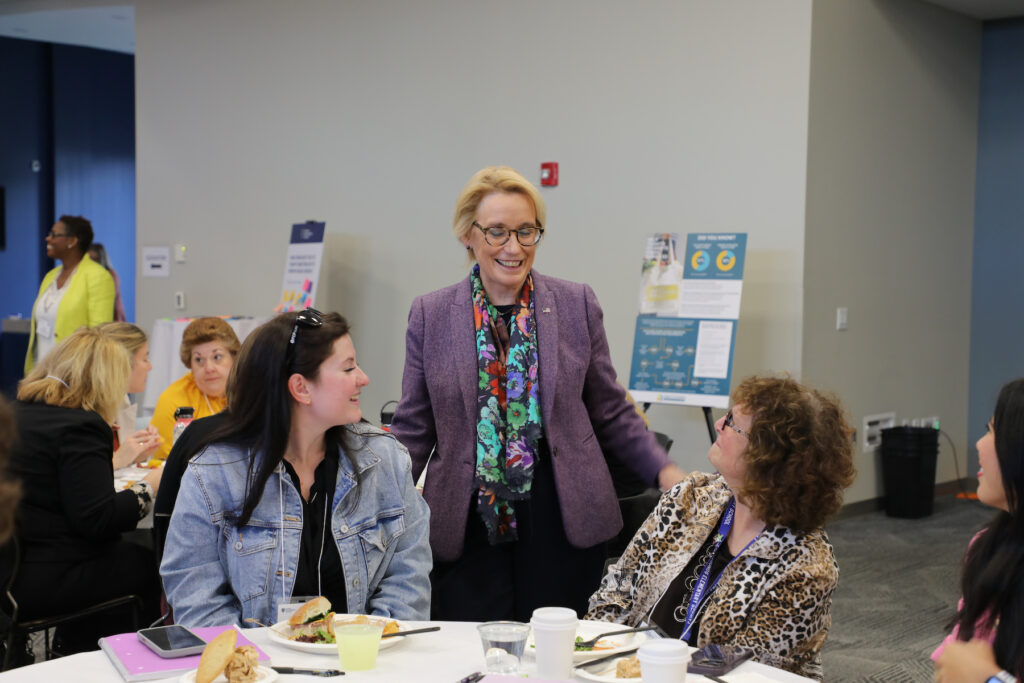SNHU hosted NH university and community leaders, state and federal representatives, and learners for a conversation about basic needs policy and supports.
Colleges were traditionally designed to serve recent high school graduates enrolling full-time. But that is no longer true for many students. Twenty-four percent of today’s learners are parents, 64 percent are working, and 6 percent are military-connected. These obligations, on top of students’ academic program success and the rising costs of college, have resulted in an estimated 3 in 5 college students experiencing basic needs insecurity – meaning that they face challenges with access to food, housing and transportation. Higher education institutions and policymakers must find ways to support these learners.
Closing the student basic needs gap isn’t just the right thing to do, it helps learners stay focused on their studies and increases persistence. Finding long-term solutions to basic needs insecurity will require collaboration between institutions of higher education and state and federal policymakers. With this collaboration in mind, Southern New Hampshire University (SNHU) President Lisa Marsh Ryerson and the Center for Higher Education Policy and Practice (CHEPP) convened leaders from New Hampshire higher education institutions, community-based organizations, state and federal representatives, and college students to share their experiences and discuss sustainable solutions to learners’ food and housing insecurity in New Hampshire and across the country.
In welcoming attendees, President Ryerson shared her commitment to increasing economic opportunity and social connectedness across generations, including supporting every learner on their academic journey and helping them meet basic needs while enrolled in higher education.
U.S. Sen. Maggie Hassan helped kick off the discussion by saying, “America should be a place where if you work hard, better is always possible.” Sen. Hassan shared her commitment to being a partner in the work to ensure that college students have the necessary supports to access and complete their education.

During the event, five students spoke about their experiences navigating college and the difficulty of staying enrolled when they couldn’t access reliable housing or transportation. They shared that covering college tuition costs from one semester to the next is a constant struggle. One student explained how being the mother of a young child has made access to student housing and childcare a necessity as she completes her degree.
These students are in college because they know that a degree can lead to long-term economic safety and mobility for themselves and their families. At the same time, their paths are riddled with challenges outside of their control.
When asked what policy change they wanted to see implemented to help students meet basic needs, students responded with a range of ideas, including transportation support such as gas cards, more support for out-of-state students who struggle to find local services, guaranteed stable housing, and additional scholarships to cover college costs.
Following the student panel, CHEPP Executive Director Jamie Fasteau facilitated a roundtable discussion with basic needs coordinators from SNHU, the University of New Hampshire, Manchester Community College, and SchoolHouse Connection, a national nonprofit organization focused on ending student homelessness. Panelists discussed how their institutions and organizations are working to meet the basic needs of students on their campuses – and what else is needed to unlock access and opportunity for more learners across higher education systems.
A major theme of the roundtable discussion was the “invisibility” of students who are struggling to access food and housing. Some institutions are surprised to discover that students on their campuses struggle to find food or housing. Roundtable participants recounted stories from students who experience a sense of imposter syndrome as a result of their struggles and start to wonder if college is really “for them.”
Despite institutions’ best efforts to support students in need, additional supports and policy at the institutional, state, and federal levels are urgently needed. New policies can help create better connectivity through federal financial aid, improve access to information about supports and services, increase emergency grant support, and ensure more seamless student access to SNAP.
The basic needs event at SNHU was a call to action for institutions and individuals who care about the health and well-being of today’s learners. When basic needs are met, students can persist and succeed. Together, we can ensure that learners from all backgrounds have access to the promise of higher education. We can do this by supporting efforts to ensure students have access to basic needs coordinators to connect them to available supports and services, emergency grants, and direct services. We must also advocate for college students to have streamlined access to programs like the federal SNAP program. Let’s get to work!

